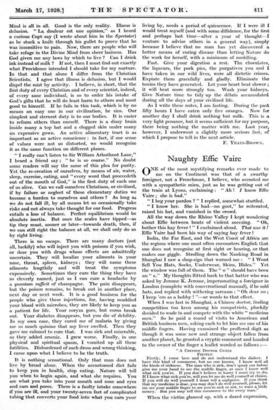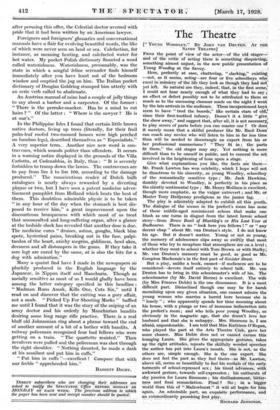Naughty Effie Vaire
ONE of the most Mystifying remarks ever made to me on the Continent was that of a swarthy foreigner, not a Frenchman, I believe, who accosted me with a sympathetic Mien; just as he was getting out of the train at Lyons, exclaiming: " Ah ! / know Effie Vaire; she is bad." " I beg your pardon ? " I replied, somewhat startled. "I know her. She is bad—no goot," he reiterated, raised his hat, and vanished in the crowd. All the way down the Rhone Valley I kept wondering about Effie between bouts of violent sneezing. "Oh, bother this hay fever ! " I exclaimed.aloud. That was it ! Effie Vaire had been his way of saying hay fever! India, the Far East, and the West Coast of Afriaa are the regions where one most often encounters English that one does not recognize at first sight or hearing, or that makes one giggle. Strolling down the Nanking Road in Shanghai I saw a shop-sign that warned me: "I Wont Sell You Hats, Socks, Underwear, Skins, Hides." Yet the window was full of them. The" o" should have been an" a." My thoughts flitted back to that hatter who was asked by Jerome K. Jerome, impersonating a foreigner in London (complete with conversational manual), if he sold hats, and replied with withering sarcasm: "Oh dear no; I keep 'em as a hobby! "—or words to that effect. When I was last in Shanghai, a Chinese doctor, finding competition too keen among his compatriots, pluckily decided to wade in and compete with the white" medicine men." So he paid a round of visits to American and British business men, asking each to let him see one of his middle fingers. Having examined the proffered digit as though it was some new and strange object fallen from another planet, he grunted a cryptic comment and handed to the owner of the finger a leafiest worded as follows :- "A CIEINESR Docros Coarss
FIRSTLY.
Firstly, I come here and do not understand the dialect. I have this kind of commerce, but no one knows. I know well all
the kinds of sickness.- man who is sick, don't speak out before giv.e Ine your hand to see the middle finger, at once I know well what sick you're. If you don't believe in hurry I must try to do, If I know whasick you're, will you let me do well yourself at choice. If you will do well yourself I must tell a nighprice. if you think that my medicine is dear, you may don't do well yourself, please, let me see your middle finger to see you're sick or not, to want a little money. But you may tell this commerce to the every man." When the victim glanced up, with a dazed expression, after perusing this offer, the Celestial doctor averred with pride that it had been written by an American lawyer.
Foreigners and foreigners'. glossaries and conversational manuals have a flair for evolving beautiful words, the like of which were never seen on land or sea. Calefaction, for instance, as meaning heating, and calefacted water for hot water. My pocket Polish dictionary flaunted a word called waterishness. Waterishness, presumably, was the state in which a songful feline serenader finds himself immediately after you have leant out of the bedroom window and emptied the jug on him. The Italian pocket dictionary of Douglas Goldring stumped him utterly with an eerie verb called to abalienate.
An Austrian manual of mine had a couple of jolly things to say about a barber and a carpenter. Of the former : "There is the perruke-maeker. Has he a mind to cut hairs ? " Of the latter : "'Where is the sawyer ? He is at our's."
In the Philippine Isles I found that certain little brown native doctors, living up trees (literally, for their frail palm-leaf roofed two-roomed houses were high perched on bamboo legs), described themselves as" Especialists." A very superior term. Another nice new word is con- travenes, which sounds politer than offenders. It occurs in a warning notice displayed in the grounds-of the Villa Carlotta, at Cadenabbia, in Italy, thus : "It is severely forbidden to tramp down the lawns. The contravenes are to pay from lire 5 to lire 100, according to the damage produced."- The conscientious reader of Dutch bulb catalogues is nearly always rewarded by a diverting plulase or two, hilt I have seen a patent medicine adVer- tisement pamphlet from Holland which beats the best of them. This doubtless, admirable physic is to be taken "m any hour of the day when the stomach is best dis- posed to receive him," a great improvement upon the discourteous brusqueness with which most of us treat . . .
that =consulted and long-suffering organ, after a glance at the bedside clock has revealed that another dose is due. The medicine cures " druises, astma, goughs, black blue spote, hysterical pains, breaking out in the fase, palpi- taedoa of the heart, axichy megrim, giddiness, hesd akes, deesness and all distompers in the gums. If they take it sore legt are cured by the same, at is also the bite for a dog with admiration." - Many a quaint find have I made in the newspapers so pluckily produced in the English language by the Japanese, in Nippon itself and Manchuria. Though as socially sensitive as most of us I would gladly have been among the latter category specified in this headline : "Madman Runs Amok, Kills One, Cuts Six," until I read on and discover that the cutting was a gory affair; not a snub. "Picked Up For Shooting Marks " baffled me until I found that it was the story of the sniping of an army doctor and his orderly by Manchurian bandits desiring some long range rifle practice.. There is a real• bluff old Johnsonia.n ring about a phrase toward the end of another account of a bit of a bother with bandits. A railway policeman recognizedfour bad fellows who were getting on a train. "The quartette resisted." Then revolvers were pulled and the policeman was shot through the right shoulder. "Nothing daunted, he made a dash at his assailant and put him in cuffs."
- "Put him in cuffs "—excellent ! Compare that with our feeble "apprehended him."
BASSETS DICEY.











































 Previous page
Previous page